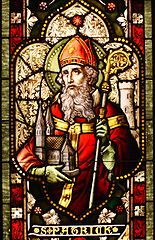
The Life And Writings Of Saint Patrick -Saint Patrick
III.—LEGAL RELATIONS BETWEEN CHURCH AND STATE
The relations between the Church and the Irish tribes were very intimate, but also somewhat peculiar.
The Brehon Code places the King and the Bishop on terms of equality in the social scale, the Bishop being the spiritual, and the King the temporal head of the tribe. Hence an equal ‘dire’-fine was fixed for a King and for a Bishop; or, as it is elsewhere explained, the honour-price of both was equal in the estimation of the law. Even at the social board the haunch, as the choice joint, was reserved by law for the King, the Bishop, and the Ollave, or literary doctor.
It has been often said that there were no tithes in Ireland before Henry II. introduced them. Such statements are unfounded, for the Brehon Code prescribes payment of ‘tithes, first fruits, and offerings’ to the clergy, on the ground that the payment of these dues are a return for spiritual benefits, and also such payment averts plagues, and maintains amity between the rulers and the people, and averts strife and wars. The dependence of the monk on his abbot was also legally recognised, so that no contract of the monk was valid in law without the consent of his abbot. But if a Bishop ‘stumbled’ he was, like a false-judging King, to be degraded, and he forfeited thereby all claim to ‘dire’-fine or honour-price.
So, likewise, the word of a King, Bishop, or Ollave was accepted as higher than the oath of any of the inferior orders, both clerical and lay. The furniture and relics of a church were also specially protected against seizure by distress; and the regulations regarding distresses were all made with the advice and concurrence of the Church. Clerics were also by law exempted from the duty imposed on other spectators, of intervening by the strong hand to prevent unjust aggression of the weak. Recourse to violent methods was deemed inconsistent with their sacred character.
But ecclesiastics, though specially privileged in many ways, were not exempt from distraint if they failed to fulfil their obligations. Their cattle could be seized and a ‘gad-tye be put upon their bell-houses’; and they might be warned not to officiate in public until they had satisfied the claims of justice.
The observance of Sundays and Festival days was also recognised by law, and a better dress than ordinary was prescribed to be worn by the higher classes, according to their station, on those days.
The Church enjoyed certain lands within the termon, whose tenants were bound to pay rent in kind to the ecclesiastics of the Church. On the other hand the clergy of the church were bound to give the tenants ‘preaching’ and ‘offering’ (mass), to give them ‘right repentance’ and ‘instruct their children.’ Tithes, first fruits, and offerings were due from the tenants; spiritual service from the Church. Restitution was to be made for any illegal seizure of Church property; on the other hand, the Church was bound to feed the poor, who had neither tribe, nor land, nor cattle.
These regulations in the laws are most minute, and are based on the teaching of the New Testament, with special application to the peculiar circumstances of the country. From this point of view the Code is conceived in a truly Christian spirit; its provisions are admirably designed to promote charity and good will; but they are sometimes very complex and hard for us to understand.

 Keep Site Running
Keep Site Running